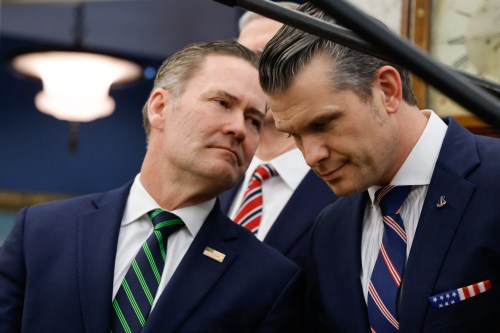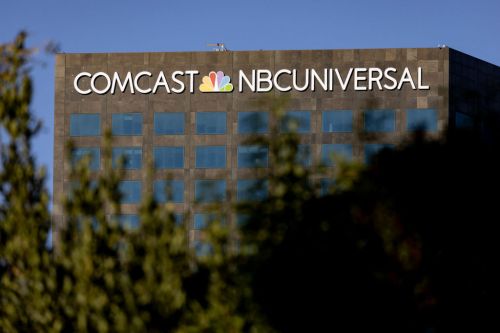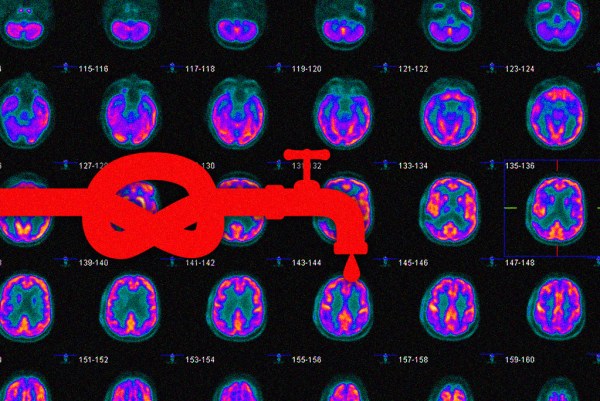Happy Thursday! And happy Opening Day to all who celebrate (even Cubs and Dodgers fans, despite the fact their teams already played in Tokyo last week). As Charlie Hustle, aka Pete Rose, once said: “Opening Day is like Christmas, except it’s warmer.”
Quick Hits: Today’s Top Stories
- The Atlantic on Wednesday published the full text thread in which top administration officials discussed plans for a U.S. military campaign targeting the Iranian-backed Houthis in Yemen. In the communications—conducted over a Signal group chat to which Atlantic editor in chief Jeffrey Goldberg was inadvertently added—Defense Secretary Pete Hegseth shared sensitive operational details about the March 15 airstrikes on the same day they were carried out. Appearing to contradict administration officials’ insistence that the chat did not divulge classified information, the messages included information about the timing of attacks using F-18 fighter jets, MQ-9 drones, and Tomahawk cruise missiles. “If this text had been received by someone hostile to American interests—or someone merely indiscreet, and with access to social media—the Houthis would have had time to prepare for what was meant to be a surprise attack on their strongholds,” Goldberg noted in the report. “The consequences for American pilots could have been catastrophic.”
- The Sudanese Armed Forces (SAF) have retaken the country’s capital of Khartoum, Sudan’s military chief, Gen. Abdel Fattah al-Burhan, announced Wednesday. The capital city has been at the center of fighting throughout the nearly two-year civil war between the Sudanese army and the paramilitary Rapid Support Forces (RSF), which as of late 2024 had left more than 28,000 people dead nationwide and displaced 11 million others. The capture of Khartoum and its international airport marked a key victory for the SAF, though fighting is likely to continue as the RSF fighters dig in in the western Darfur region.
- Brazil’s Supreme Court unanimously ruled Wednesday that former President Jair Bolsonaro must stand trial for allegedly attempting to overturn his loss in the country’s 2022 election and planning a coup. Prosecutors accuse the country’s former leader of plotting to kill his successor, President Luiz Inácio Lula da Silva, as well as the vice president and a Supreme Court justice. Bolsonaro, who has long denied the charges against him, said Wednesday that he is facing a “political trial” aimed at preventing him from running for president in 2026. The justices said that seven of Bolsonaro’s political allies should also stand trial on five counts for their alleged involvement in the scheme.
- President Donald Trump on Wednesday signed an executive order imposing 25 percent tariffs on cars and car parts imported into the United States. The new duties, which are intended to boost the domestic auto industry, are expected to hit both foreign manufacturers and American automakers who build cars abroad or import components. However, the White House later noted that auto parts covered by the U.S.-Canada-Mexico Agreement (USMCA) would be exempt until Customs and Border Protection “establishes a process to apply tariffs to their non-U.S. content.” The measures are set to take effect on April 3 at 12:01 a.m. ET.
- The U.S. Court of Appeals for the 1st Circuit on Wednesday denied a request by the Trump administration to reverse a block on its efforts to pause federal funding to states. The decision, which bars the Office of Management and Budget from implementing a now-rescinded January memo freezing federal payments, came in response to lawsuits brought by attorneys general from 22 states and the District of Columbia. In an opinion upholding U.S. District Judge John McConnell’s ruling earlier this month, the three-judge panel wrote that the freeze would result in a “number of harms” to the plaintiff states, including “the inability to pay existing debt; impediments to planning, hiring, and operations; and disruptions to research projects by state universities.”
We can end smoking faster.

What’s Up With mRNA Research?

Health and Human Services Secretary (HHS) Robert F. Kennedy Jr. may not be chatty on Signal, but he’s making plenty of noise in the medical world. Just over a month into his tenure, Kennedy is beginning to reverse one of the first Trump administration’s major successes: mRNA vaccines.
As COVID-19 spread across the U.S. in 2020, the Trump administration launched Operation Warp Speed—an initiative that brought the COVID-19 mRNA vaccine to market in record time. But with the pandemic also came a revival of vaccine skepticism. Now, with Kennedy atop HHS, that anti-vax sentiment is making its way to the highest levels of government just as scientists are achieving striking breakthroughs in mRNA research.
Immunization technology using mRNA is not like vaccines of the past. “It’s a very novel approach,” Dr. Chris Beyrer, an epidemiologist and head of the Duke Global Health Institute, explained to TMD. Messenger RNA is a molecule that acts as the transcript for creating a protein, like an antibody or an antigen. But when mRNA is injected into the body, it is quickly degraded by certain enzymes.
But recent advances in nanotechnology led to a major ...
As a non-paying reader, you are receiving a truncated version of The Morning Dispatch. You can read our 1,085-word item on the latest in mRNA research in the members-only version of TMD.
Today’s Must-Read
Over a few short years, small drones have morphed from playthings—meant for wedding photography and weekend hobbyists—to deadly weapons of war, dozens of which can be coordinated for maximum effect. In fact, drones have become the defining weapon of the war in Ukraine, allowing a country with a meager air force, few missiles, and a scant navy to hit targets far beyond the frontlines. Mathematician's unit, part of the Khartiia Brigade station in the northeast corner of Ukraine, is engaged in some of the most cutting-edge drone innovation in the world. In December, the brigade pulled off the first ever air- and ground-drone assault on a Russian position. To pull it off, they had to come up with new methods of mission planning, tactics, and coordination procedures from scratch.
Toeing the Company Line
The ‘Hoax’ Hoax
Better damage control through gaslighting.
The Real Signal of Signalgate
Team Trump’s anti-ally threats aren’t just bluster.
Javier Milei and the Legitimacy of Libertarian Policy
He has put one of the world’s true economic basket cases on the path toward fiscal sustainability.
Experts Call Use of Signal ‘Unbelievably Poor’ Security Practice
The federal government previously warned against using the app.
Social Media Users Spread False Claim That Elon Musk Bought MSNBC
Comcast, MSNBC’s parent company, currently plans to integrate the news network into a new spinoff company.
When the Right Went Woke
Cynicism is a gateway drug.
Worth Your Time
- Writing for Comment Magazine, Nick Spencer considered whether the West is in the midst of a great overcorrection. “We in the West have never loved our political leaders. Mass Observation studies of Britain in the 1930s and 1940s reported the public describing the political class as ‘hypocritical’ and ‘distrusted,’ full of ‘twisters,’ ‘clever rogues,’ and ‘liars.’ Skepticism toward political leaders is the price of democracy,” he wrote. “If, as many people think, healthy skepticism has long since tipped over into a corrosive cynicism, some kind of course correction is welcome. And yet we are seeing signs of a perilous overcorrection. Polls tell us that a perturbing number of (especially) young people say they want a strong leader, unencumbered by the tedious restraints of democracy, to ‘sort things out.’ Donald Trump’s apparent preference for autocrats over the democratically elected leaders that have traditionally made up America’s allies adds fuel to this fire. The trend has generated some excitable headlines. ‘More than half of Gen Z wants UK to become a dictatorship,’ one headline claimed. … Correcting for democracy’s undoubted inadequacies, we cannot afford to overcorrect our way to autocracy.”
Presented Without Comment
Newsweek: Trump Dubs Himself ‘Fertilization President’ At Women’s History Month Event
“We’re going to have tremendous goodies in the bag for women, too,” Trump said Wednesday. “The women, between the fertilization and all of the other things that we’re talking about, it’s going to be great.”
…
“Fertilization,” he said as people in the audience laughed. “I’m still very proud of it. I don’t care. I’ll be known as the fertilization president and that’s not bad. I’ve been called much worse and actually, I like it. I like it.”
In the Zeitgeist
The Disney live-action Snow White arrived in American theaters on Friday, and with it, a fair bit of controversy. The modern remake of the classic fairytale currently has a dismal 1.6 out of 10 stars on IMDb, but we’ll let you be the judge.















